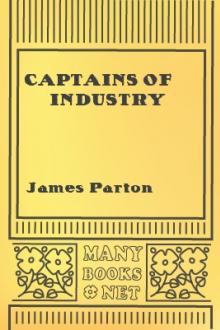Captains of Industry - James Parton (the false prince txt) 📗

- Author: James Parton
- Performer: -
Book online «Captains of Industry - James Parton (the false prince txt) 📗». Author James Parton
It was Frederick Tudor also who originated and developed the best methods of cutting, packing, storing, and discharging ice, so as to reduce the waste to the minimum. I am assured by a gentleman engaged in the business that the blocks of ice now reach Calcutta, after the long voyage from Boston, with a waste scarcely noticeable. The vessels are loaded during the cold snaps of January, when water will freeze in the hold of a vessel, and when the entire ship is penetrated with the intensest cold. The glittering blocks of ice, two feet thick, at a temperature below zero, are brought in by railroad from the lakes, and are placed on board the ships with a rapidity which must be seen to be appreciated. The blocks are packed in sawdust, which is used very much as mortar is used in a stone wall. Between the topmost layer of ice and the deck there is sometimes a layer of closely packed hay, and sometimes one of barrels of apples. It has occasionally happened that the profit upon the apples has paid the freight upon the ice, which usually amounts to about ten thousand dollars, or five dollars a ton.
The arrival of an ice ship at Calcutta is an exhilarating scene. Clouds of dusky natives come on board to buy the apples, which are in great request, and bring from ten to thirty cents each, according to the supply. Happy is the native who has capital enough to buy a whole barrel of the fruit. Off he trudges with it on his back to the place of sale, or else puts it on a little cart and peddles the apples about the streets. In a day or two that portion of the cargo has disappeared, and then the ice is to be unloaded. It was long before a native could be induced to handle the crystal blocks. Tradition reports that they ran away affrighted, thinking the ice was something bewitched and fraught with danger. But now they come on board in a long line, and each of them takes a huge block of ice upon his head and conveys it to the adjacent ice-house, moving with such rapidity that the blocks are exposed to the air only a few seconds. Once deposited there, the waste almost ceases again, and the ice which cost in Boston four dollars a ton is worth fifty dollars.
When Frederick Tudor had been employed twenty-five years in this trade, finding it inconvenient to be separated from the great body of merchants, he embarked again in general mercantile business, by way of re-uniting himself to his former associates. The experiment resulted in ruinous losses. In less than three years he was a bankrupt, and owed his creditors two hundred and ten thousand dollars more than he could pay. The ice business being still profitable and growing, it was proposed to him that he should conduct it as the agent of his creditors, retaining a specified sum per annum for his personal expenses. To this he objected, and said to them:—
"Allow me to proceed, and I will work for you better than I can under any restriction. Give me the largest liberty, and I will pay the whole in time with interest."
He was then fifty-two years of age, and he had undertaken to pay an indebtedness, the mere interest of which was about ten thousand dollars a year. By the time he had got fairly at work the treachery of an agent whom he had raised from poverty to wealth lost him his Havana monopoly, his principal source of profit. Then it became necessary to buy land bordering the lakes from which he gathered ice, and to erect in Calcutta, New Orleans, and elsewhere expensive and peculiarly constructed buildings for storage. Occasionally, too, he experienced the losses and adverse incidents from which no business is exempt. Nevertheless, in fourteen years from the date of his bankruptcy he had paid his debts, principal and interest, amounting to two hundred and eighty thousand dollars, besides having acquired a large quantity of real estate, some of which had increased in value tenfold. Thus, while paying his debts, and in the very process of paying, and while thinking only of his creditors' interest, he had gained for himself a very large fortune. He continued an ice merchant for more than fifty years; or, as he said himself:—
"I began this trade in the youthful hopes attendant on the age of twenty-two. I have followed it until I have a head with scarcely a hair that is not white."
It was this enterprising merchant who may be said to have created the beautiful seaside retreat near Boston called Nahant, where he invented many ingenious expedients for protecting trees and shrubs from the east winds which lacerate that rock-bound coast. His gardens and plantations in Nahant were famous many years before his death. He died in 1864, aged eighty-one, leaving to his children and to his native State a name which was honorable when he inherited it, and the lustre of which his life increased.
Fifty years ago, this man used to sell vegetables and fruit from door to door in the streets of Rochester, N. Y. He had a small farm a few miles out of town, upon which he raised the produce which he thus disposed of. An anecdote is related of a fine lady who had recently come to Rochester as the wife of one of its most distinguished clergymen. She ran up into her husband's study one morning, and said to him:—
"Why, Doctor, I've just seen the only gentleman I have yet met with in Rochester, and he was at our basement door selling vegetables. How wonderful! Who is it? Who can it be?"
"It must be Myron Holley," said her husband.
Another of his lady customers used to say that he sold early peas and potatoes in the morning with as much grace as he lectured before the Lyceum in the evening. Nor was it the ladies alone who admired him. The principal newspaper of the city, in recording his death in 1841, spoke of him as "an eminent citizen, an accomplished scholar, and noble man, who carried with him to the grave the love of all who knew him."
In reflecting upon the character of this truly remarkable person, I am reminded of a Newfoundland dog that I once had the honor of knowing near the spot on the shore of Lake Ontario where Myron Holley hoed his cabbages and picked his strawberries. It was the largest and most beautiful dog I have ever seen, of a fine shade of yellow in color, and of proportions so extraordinary that few persons could pass him without stopping to admire. He had the strength and calm courage of a lion, with the playfulness of a kitten, and an intelligence that seemed sometimes quite human. One thing this dog lacked. He was so destitute of the evil spirit that he would not defend himself against the attacks of other dogs. He seemed to have forgotten how to bite. He has been known to let a smaller dog draw blood from him without making the least attempt to use his own teeth in retaliation. He appeared to have lost the instinct of self-assertion, and walked abroad protected solely, but sufficiently, by his vast size and imposing appearance.
Myron Holley, I say, reminds me of this superb and noble creature. He was a man of the finest proportions both of body and of mind, beautiful in face, majestic in stature, fearless, gifted with various talents, an orator, a natural leader of men. With all this, he was destitute of the personal ambition which lifts the strong man into publicity, and gives him commonplace success. If he had been only half as good as he was, he might have been ten times as famous.
He was born at Salisbury, Conn., in 1779, the son of a farmer who had several sons that became notable men. The father, too, illustrated some of the best traits of human nature, being one of the men who make the strength of a country without asking much from the country in return. He used to say to his sons that the height of human felicity was "to be able to converse with the wise, to instruct the ignorant, to pity and despise the intriguing villain, and to assist the unfortunate." His son Myron enjoyed this felicity all the days of his life.
After graduating at Williams, and studying law at New Haven, he set his face toward western New York, then more remote from New England than Oregon now is. He made an exquisite choice of a place of residence, the village of Canandaigua, then only a hamlet of log huts along the border of one of the lakes for which that part of the State is famous. The first step taken by the young lawyer after his arrival fixed his destiny. He was assigned by the court to defend a man charged with murder—a capital chance for winning distinction in a frontier town. Myron Holley, however, instead of confining himself to his brief and his precedents, began by visiting the jail and interviewing the prisoner. He became satisfied of his guilt. The next morning he came into court, resigned the case, and never after made any attempt to practice his profession.
He was, in fact, constitutionally disqualified for the practice of such a calling. Having a little property, he bought out a bookseller of the village, laid out a garden, married, was soon elected county clerk, and spent the rest of his life in doing the kind of public service which yields the maximum of good to the country with the minimum of gain to the individual doing it.
The war of 1812 filled all that region with distress and want. It was he who took the lead in organizing relief, and appealed to the city of New York for aid with great success. As soon as the war was over, the old scheme of connecting Lake Erie with the Hudson by a canal was revived. It was an immense undertaking for that day, and a great majority of the prudent farmers of the State opposed the enterprise as something beyond their strength. It was Myron Holley who went to the legislature year after year, and argued it through. His winning demeanor, his persuasive eloquence, his intimate knowledge of the facts involved, his entire conviction of the wisdom of the scheme, his tact, good temper, and, above all, his untiring persistence, prevailed at length, and the canal was begun.
He was appointed one of the commissioners to superintend the construction of the canal at a salary of twenty-five hundred dollars a year. The commissioners appointed him their treasurer, which threw upon him for eight years an inconceivable amount of labor, much of which had to be done in situations which were extremely unhealthy.





Comments (0)